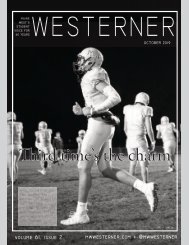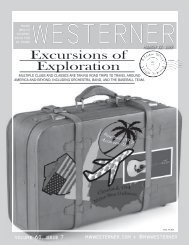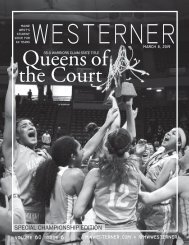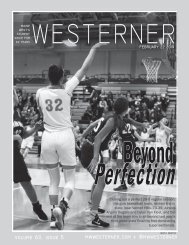You also want an ePaper? Increase the reach of your titles
YUMPU automatically turns print PDFs into web optimized ePapers that Google loves.
um
4 news/westerner
1.
2.
3.
4.
A T C H E
F I N A E
C O U N T
D O O W N
BY NATALIE CASTELLANOS
reporter
Iced coffee sales are about skyrocket and libraries
will soon flood with sleep-deprived
students preparing for final exams. Finding a
balance between maintaining a healthy mind and
good grades is the top priority for students, and
this year’s new four-day finals schedule aims to accommodate
that.
Finals have usually been worth at least 15 percent
of a grade, so if a student does poorly on the
final but usually does well in the class, their final
grade in the class might not fully reflect their
abilities.
As of this year, though, courses are no longer
MAINE WEST STUDENTS ADJUST TO THE STRESSES
AND CHANGES FINALS POSE
required to give cumulative finals. The decision
is up to the course teams. During the final exam
days, teachers may decide to give a unit test, assign
a project, give no assessment at all or stick
with the traditional cumulative final.
The Foreign Language Department, for example,
has decided to get rid of finals altogether.
According to the head of the Foreign Language
Department, Alan Matan, the decision to discard
finals is in the “best interest of the students.”
Junior Pelin Keceli said not having a foreign
language final is “better for me because it is less
time and less work.” However, removing finals
also has its drawbacks. “I feel as if I will not be
able to really test my knowledge of speaking or
knowing the language,” she said.
In the future, Matan is uncertain whether the
department will stick with the removal of finals.
However, Matan plans to keep seeing how “best
we can help our students succeed and help them
prepare for post-secondary opportunities.”
Finals in high school and those in college
share some similar aspects. As a senior majoring
in accounting at DePaul University, Asad Bashir,
Maine West class of 2015, finds high school finals
to be beneficial for college. “They’re similar in difficulty,”
he said. At DePaul, Bashir expect to see a
familiar sight during finals: mainly, “many people
November 22, 2019
in the libraries.”
Keceli prepares for her exams by setting up
certain days of the week for specific topics, and
she studies off of study guides provided by teachers
or makes her own.
Keceli finds the best place to study is a quiet
place with “no one I know unless it’s a topic that I
would want to study with a friend.”
Both Bashir and Keceli agree that working in
larger groups lead to chaos and socializing rather
than learning and studying.
new 2019
finals schedule:
two daily final sessions:
8:30-10 a.m.
10:15-11:45 a.m.
Dec. 17: Periods 1 and 3
Dec. 18: Periods 2 and 4
Dec. 19: Periods 5 and 7
Dec. 20: Periods 6 and 8
NEVER
3 MONTHS INTO THE SCHOOL YEAR, LINK CREW
CONTINUES TO PROVIDE HELP TO FRESHMEN
DESPITE INITIAL GROWING PAINS
63.6% of Maine West Students
feel that freshmen don’t need
upperclassmen’s help adjusting
to Maine West*
break
theChain
BY JAMESON BECKMAN
news editor
Link Crew, Warrior Pride’s replacement, aims to ease freshmen into high
school and help them make connections with peers. While an important
initiative in theory, the project has a few issues in practice.
The program attempts to create groups for freshmen, where they can find
friends in their peers and role models in their upper class leaders. Senior
Rylan Turner, one of the leaders in Link Crew, said, “freshmen beginning
high school don’t always have an easy time finding their place with other
freshmen. The intention [of Link Crew] is to create a comfortable space for
freshmen to incorporate into the community.”
Link Crew is especially helpful for students coming to Maine West who
don’t know many other kids in their grade. Freshmen from River Trails, for
example, don’t always have as many established connections as those from
Algonquin. Link Crew hopes to remedy this and facilitate the social bonds
between students in 10 to 15 person groups.
Warrior Pride, the predecessor to Link Crew, similarly hoped to create
bonds between Maine West students of all grade levels, but the group met
only at the beginning of freshman year; Link Crew was adopted to help
freshmen adapt throughout the year.
While this was initially seen as a bonus to the program’s proponents,
there are students who believe the weekly meetings have turned out to be too
frequent. According to junior Jane Rothweiler, a Link Crew leader, “Maybe
every other week would be better. It’s good to meet with [the freshmen] every
couple weeks.” While the advice leaders give freshmen can be helpful, there’s
only so much they can give every week before groups end up resorting to
playing Uno instead.
Where some students take issue with Link Crew is in the time requirements
they feel might be better spent elsewhere. Because a part of their study
hall is taken up by Link Crew activities, freshmen and upperclassmen alike
feel like part of their work time is robbed from them.
This has lead to absences in the Link Crew community being commonplace.
“I feel like they maybe don’t want to be here. But there are always
those kids who don’t want to be in school,” Rothweiler said. Some freshmen
end up leaving in the middle of a session, and some never show up to study
hall at all.
The argument made by Link Crew sponsors is that no freshman is likely
doing homework for the full span of study hall anyway and that it’s a helpful
way to break up the block with
meaningful activities. “Students
come out of their 90 minute study
halls for about 35 minutes, which
allows them 55 minutes of a study
hall,” assistant principal John Aldworth
said. “[W]hatever is going in those lessons is worth the 30 to 35 minutes
that they’re not in study hall.”
According to Aldworth, Link Crew is specifically organized to introduce
freshmen to Maine West and its faculties. “We kind of look at things that
are happening throughout the year and what freshmen would need that they
might not get otherwise,” he said.
For example, one Link Crew session involved the leaders taking freshmen
around the school on a scavenger hunt, filling out a worksheet as they went
along. Each destination helped students become familiar not only with the
school layout but the student services available to them as well.
However, according to Turner, even the leaders cut corners. Freshman
Sarah Schill saw this trend in her group as well. “There was only one sheet
and my leader just had it the whole time, and so she was just filling it out.
We really didn’t do it.”
*According to a Westerner survey of 151 students

















